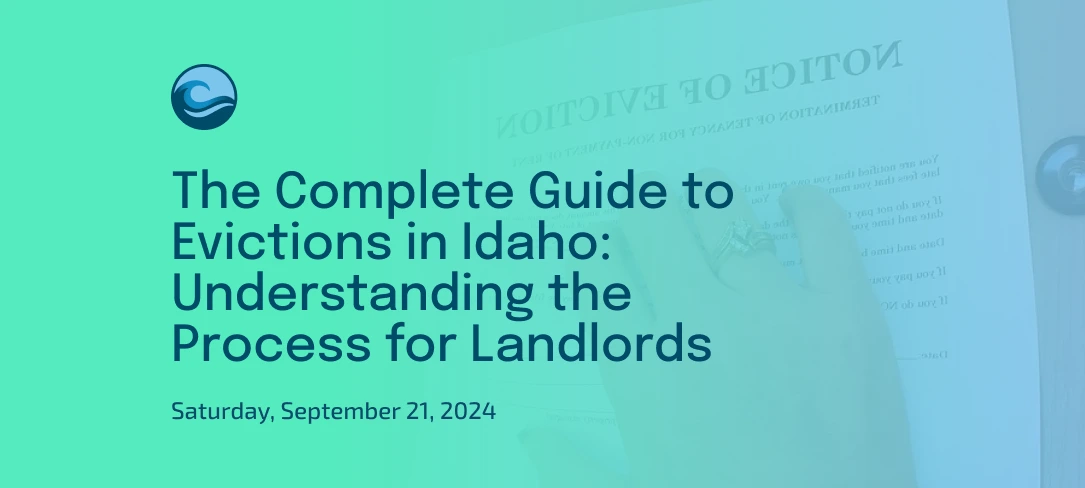Eviction court cases have been on the rise in Idaho. In 2023, court cases involving an eviction lawsuit rose 44.2% year over year. Despite the significant rise in eviction cases, the number of those cases that resulted in a formal eviction dropped by about 9%.
Despite significantly more lawsuits being filed, the eviction rate in Idaho is dropping. How is this possible? And how can you as a landlord take the right steps to peacefully resolve eviction issues while still holding them to their lease agreement?
We've got the answers for you. No landlord or tenant wants to face a drawn-out eviction lawsuit. However, it's important for you to be prepared to follow the right legal procedures to reach a resolution quickly.
Follow along with us as we guide you through Idaho's eviction laws and how you can navigate through these difficult situations successfully.
Understanding Idaho Eviction Laws
Idaho laws have their own unique parameters for landlords to follow, just like any other state. These include everything from tenant screening law to property upkeep.
Regarding the eviction process, Idaho law acts as a guideline for the steps to follow throughout the ordeal. It's not as simple as kicking a person out of your unit when they don't pay rent or break the rules of their rental agreement. It takes time, needs to have justified legal reasons, and the right paperwork must be filed.
It's critical for you as a rental property owner to understand the law if you think an eviction is necessary. We'll outline the process here, but always consult with qualified Idaho legal aid services first.
The Idaho Eviction Process
The first question on any landlord's mind is how long the eviction process will take. After all, the more time it takes the more it costs you in money and resources. The timetables vary but do have limits based on court rules.
If a tenant complies with your initial eviction notice, the process begins and ends within 3 days. If a tenant doesn't comply with your eviction, the legal eviction process can take anywhere between 2 weeks to 2 months to fully remove them from your property.
Take note that the quickest way to handle this issue is to adopt good lease enforcement practices so the need to evict doesn't happen in the first place.
The Eviction Notice
When a tenant commits a lease violation, causes excessive damage to the property, or fails to pay rent, the first step is to serve them with a written notice to quit. This written notice outlines why the tenant is being evicted and gives them a window to either fix the problem or leave the property.
In the case of non-payment of rent or a violation in the lease agreement, the notice must give them 3 days to resolve the issue and list the day the lease will terminate if not resolved. If the tenant violates the lease by causing severe property damage, you are not required to allow them to fix it. You only have to give them a three-day notice to quit.
The sole reason for eviction that allows for a notice to leave the property immediately is if the tenant is distributing, manufacturing, or using illegal substances. In this situation, the landlord can file for eviction immediately after delivering the notice.
Filing an Eviction Lawsuit
If the tenant doesn't correct the issue within the notice period and refuses to leave the property, the landlord files an eviction lawsuit in the district court for the county in which the rental unit is located.
The court documents must include a copy of the written eviction notice, the reason for eviction, and a statement asking for possession of the rental unit to be returned to the landlord. You will also have to pay a filing fee based on the amount of the claim.
Once filed, the tenant will receive a summons for eviction court and the complaint. The tenant files their answer to the complaint at this point, acting as their denial or acceptance of the eviction. The tenant has 21 days to file their answer. If the tenant fails to do so, the court issues a default judgment in the landlord's favor.
Court Hearings and Procedure
When the tenant contests the complaint, the next step is an eviction hearing typically within 12 days of the tenant filing an answer. The landlord should come prepared with a copy of the rental agreement and any evidence of the violation that the tenant committed. Both the landlord and tenant will get an opportunity to argue their case during the court hearing.
Court Mediation Services
Another option for both parties is to resolve the dispute through court mediation. Court mediation is a major reason why formal evictions have gone down in Idaho in recent years and is a way to come to an agreement peacefully.
Mediation in an Idaho eviction involves a court-appointed mediator meeting with the landlord and tenant on the day of the court hearing, rather than going in front of a judge who decides for the involved parties. The mediator would hear both sides and help them reach a compromise on the conflict. this can help solve the problem for you without having to evict and lose money on a vacancy.
Eviction Process in Idaho: Final Steps
In the Event of an Eviction Judgement
When the lawsuit does go to court and the judge rules in the landlord's favor, the tenant receives a court order to vacate the premises and return the property to you. If the reason was unpaid rent, this order comes 5 days after the judgment. In all other cases, the judgment can be enforced on the same day.
Residential tenants then have 72 hours to move out of the rental unit. If they do not do so, you can contact the sheriff's office and have a law enforcement officer force them to vacate. Do not attempt to do so yourself, only the sheriff should be involved in this situation.
In the Event of Mediation
If both parties resolve the problem in court mediation, the mediator will write up an agreement and bring it to the judge to sign. This will become a court order and both parties will be legally bound to follow it.
Eviction Protection for Idaho Landlords
Evictions are a delicate issue for landlords and tenants. The best tool you can have for these situations and to prevent evictions altogether is a property manager. Property managers can handle sensitive tenant issues and protect your rental from running into unnecessary evictions.
Here at Wave Property Management, we handle writing up comprehensive lease agreements, responding to lease violations, and ensuring your rental stays in line with proper legal compliance. We also offer eviction protection services to all of our clients. Get in touch with our dedicated team for assistance today.



